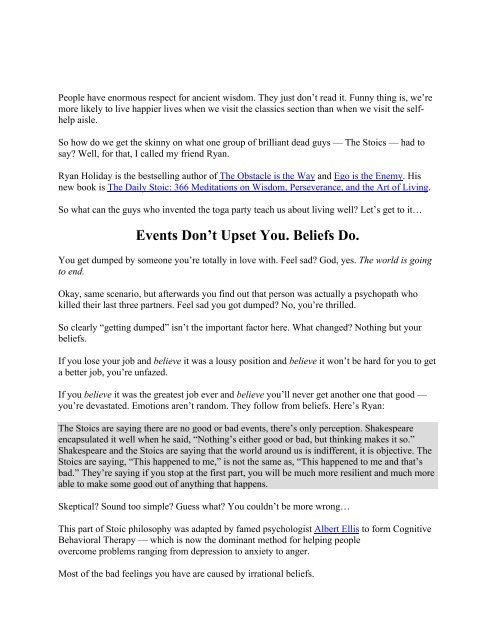Ancient Wisdom Reveals 6 Rituals That Will Make You Happy
Create successful ePaper yourself
Turn your PDF publications into a flip-book with our unique Google optimized e-Paper software.
People have enormous respect for ancient wisdom. They just don’t read it. Funny thing is, we’re<br />
more likely to live happier lives when we visit the classics section than when we visit the selfhelp<br />
aisle.<br />
So how do we get the skinny on what one group of brilliant dead guys — The Stoics — had to<br />
say? Well, for that, I called my friend Ryan.<br />
Ryan Holiday is the bestselling author of The Obstacle is the Way and Ego is the Enemy. His<br />
new book is The Daily Stoic: 366 Meditations on <strong>Wisdom</strong>, Perseverance, and the Art of Living.<br />
So what can the guys who invented the toga party teach us about living well? Let’s get to it…<br />
Events Don’t Upset <strong>You</strong>. Beliefs Do.<br />
<strong>You</strong> get dumped by someone you’re totally in love with. Feel sad? God, yes. The world is going<br />
to end.<br />
Okay, same scenario, but afterwards you find out that person was actually a psychopath who<br />
killed their last three partners. Feel sad you got dumped? No, you’re thrilled.<br />
So clearly “getting dumped” isn’t the important factor here. What changed? Nothing but your<br />
beliefs.<br />
If you lose your job and believe it was a lousy position and believe it won’t be hard for you to get<br />
a better job, you’re unfazed.<br />
If you believe it was the greatest job ever and believe you’ll never get another one that good —<br />
you’re devastated. Emotions aren’t random. They follow from beliefs. Here’s Ryan:<br />
The Stoics are saying there are no good or bad events, there’s only perception. Shakespeare<br />
encapsulated it well when he said, “Nothing’s either good or bad, but thinking makes it so.”<br />
Shakespeare and the Stoics are saying that the world around us is indifferent, it is objective. The<br />
Stoics are saying, “This happened to me,” is not the same as, “This happened to me and that’s<br />
bad.” They’re saying if you stop at the first part, you will be much more resilient and much more<br />
able to make some good out of anything that happens.<br />
Skeptical? Sound too simple? Guess what? <strong>You</strong> couldn’t be more wrong…<br />
This part of Stoic philosophy was adapted by famed psychologist Albert Ellis to form Cognitive<br />
Behavioral Therapy — which is now the dominant method for helping people<br />
overcome problems ranging from depression to anxiety to anger.<br />
Most of the bad feelings you have are caused by irrational beliefs.











